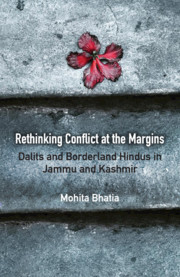Book contents
- Frontmatter
- Contents
- List of Figures and Tables
- Preface
- Acknowledgements
- 1 Introduction
- 2 Regional Diversities and the Conflict
- 3 Caste, Everyday Life and Conflict Politics
- 4 Border Realities: Contesting Hegemonic Paradigms of Nationalism and Conflict
- 5 Contesting the Homogenised Discourse of Religious Identities
- 6 Conclusion
- Glossary
- Bibliography
- Index
Preface
Published online by Cambridge University Press: 30 April 2020
- Frontmatter
- Contents
- List of Figures and Tables
- Preface
- Acknowledgements
- 1 Introduction
- 2 Regional Diversities and the Conflict
- 3 Caste, Everyday Life and Conflict Politics
- 4 Border Realities: Contesting Hegemonic Paradigms of Nationalism and Conflict
- 5 Contesting the Homogenised Discourse of Religious Identities
- 6 Conclusion
- Glossary
- Bibliography
- Index
Summary
I grew up in Jammu – one of the three main parts of the state of Jammu and Kashmir (India) – the other two being Kashmir and Ladakh. Dogri is the main language spoken in the city of Jammu, but I used Hindi and English in everyday interactions at school and with my family. I have made a few trips to Kashmir with my parents, and the anticipation of every approaching trip to Kashmir fuelled a lot of excitement in me. Trips to Kashmir felt like visiting a different world altogether in so many ways. The Valley's cold weather and its enormously scenic spaces offered a delightful respite from the scorching heat of the plains of Jammu. Although Kashmir has a different culture and language (Kashmiri), Kashmiris go out of their way to offer hospitality to their guests, including conversing in Hindi with the people of Jammu. Despite much close interaction between the people of the two regions, Jammu-ites often have an exotic and romanticised view of a ‘distinctly’ Kashmiri culture. Up until I started reading and researching on Kashmir, it was this romanticised vision that framed my understanding of the Valley.
When I moved to Delhi to pursue MPhil at Jawaharlal Nehru University, I was surprised to learn that a majority of people from across India shared not just a similar ‘exotic unfamiliarity’ with regards to Kashmir, but were also oblivious to the fact that Jammu and Kashmir comprised different parts of the state. Most students and researchers at the university coming from different parts of India equated the state of Jammu and Kashmir with just ‘Kashmir’. ‘Are you a Kashmiri Pandit (Hindu)?’ or ‘Do you speak Kashmiri?’ were the common questions I frequently encountered. Although I felt proud to be called a ‘Kashmiri’ (because Kashmir is more beautiful and scenic than many parts of Jammu, especially Jammu city), it troubled me that people outside the state of Jammu and Kashmir had only a partial understanding of it. I never missed an opportunity to educate my friends and acquaintances about the extremely diverse make-up of the state. I decided to focus my inquiry on the largely unnoticed Jammu region and foreground the plural character of the state as part of my research.
- Type
- Chapter
- Information
- Rethinking Conflict at the MarginsDalits and Borderland Hindus in Jammu and Kashmir, pp. ix - xiiPublisher: Cambridge University PressPrint publication year: 2020



